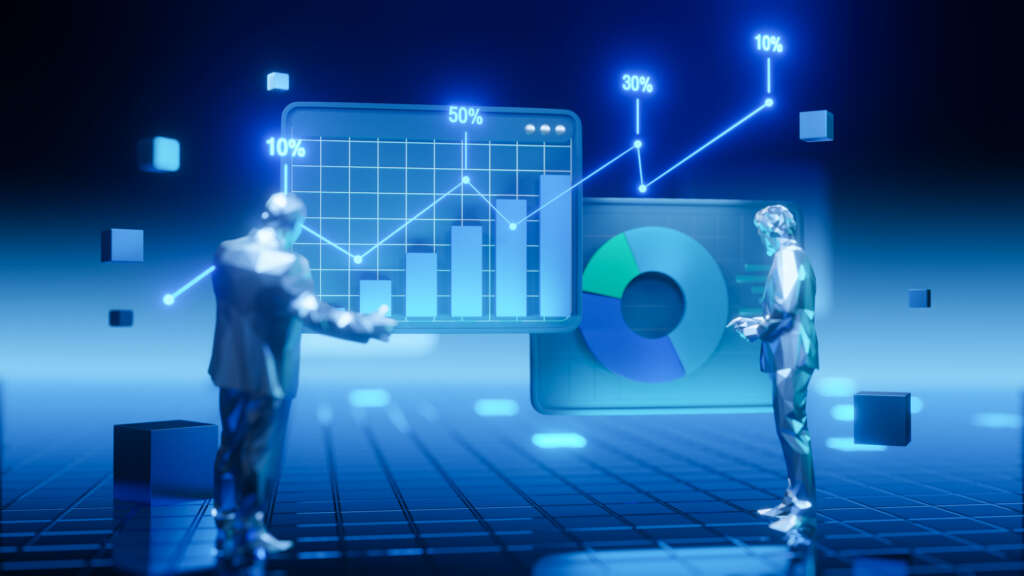Is your business using all its data potential? Could AI help unlock innovation and agility? With AI in Data-Driven Decision Making, companies can go beyond old analytics. They can turn big datasets into a growth engine and gain a competitive edge. In today’s fast digital world, 80% of decision-makers have made choices based on wrong info. Adding AI to business decisions is a big change, not just an upgrade.
Only 20% of leaders feel sure about their company’s decision-making. Yet, companies spend over $29 billion a year on business intelligence, says McKinsey. This leads to inefficiencies; a Fortune 500 company loses about $250 million yearly due to bad decisions. With 41% of leaders struggling with data complexity, the need for AI is clear.
Picture a company where AI cuts down the $15 million yearly waste from poor decisions. It also frees up 60-70% of employees’ time, as McKinsey notes. This could mean a 66% increase in productivity, over 10% cost savings, and a 20% drop in errors. AI in business decisions is set to bring these benefits, using generative AI to go beyond human limits.
AI’s impact is huge: By 2025, 90% of data and analytics creators will use AI, says Gartner. This shows AI in Data-Driven Decision Making is the future. AI plays a key role in finance, retail, healthcare, and supply chains, making decisions in real time and predicting outcomes.
AI helps the finance sector prevent fraud and manage risks. Healthcare uses AI to predict outbreaks, identify high-risk groups, and customize treatments. In supply chains, AI improves demand forecasting and inventory management. In this AI era, using data intelligence for decisions is crucial.
Next, we’ll explore the changing world of business intelligence. We’ll look at how AI makes decisions, the tools that change companies, and AI’s impact across industries. We’ll also discuss the challenges and ethics of AI and the exciting possibilities ahead. The journey into AI-enhanced decision processes starts now.
Evolving Landscape of Business Intelligence
The rapid growth of data has changed business intelligence. It has brought new ways and tools that change how companies work. Using data-driven strategies with AI is a big change. It helps companies go through lots of data to find important insights. Studies show that 77% of data experts now focus on making decisions with data instead of just guessing.
Now, businesses aim for hyper-personalization, moving away from the old one-size-fits-all method. They use data on what customers do and like to make services just for them. This is thanks to advanced analytics and AI that give insights and help make quick decisions. These tools make it easier to transform decisions with AI, making customers happier and more loyal.
Cloud solutions like those from Google BigQuery and Snowflake are changing how data is stored and used. They offer more space, flexibility, and save money. These platforms help companies deal with lots of data, solve problems with data quality and security, and make decisions faster.

AI is becoming key in business intelligence. Tools like IBM Watson Analytics and RapidMiner improve how data is handled and analyzed. They help businesses quickly adapt to changes, predict outcomes, and make strategies for growth and staying ahead. But, managing lots of data and following rules is hard and needs new ideas for keeping data safe and secure.
Business intelligence is getting more open, letting non-tech people use data analytics. Tools like Tableau and Power BI make this possible. This change makes things more transparent and helps everyone make better decisions, greatly transforming decisions with AI for a smarter future.
The Mechanics of AI in Data-Driven Decision Making
AI has changed the game in data-driven decision-making. It automates tasks like data entry and report generation. This means less room for human error and faster processing of big datasets.
Smarter decisions with AI are already here in many areas. For example, AI in retail predicts what products customers will want and suggests personalized recommendations. This boosts customer satisfaction and loyalty. It shows how AI goes beyond old ways of analyzing data, helping businesses make better, proactive choices.

AI uses machine learning and predictive analytics to quickly turn data into useful insights. This makes decisions faster and less prone to bias and errors. Amazon and Netflix use AI to suggest products and shows based on what users like, improving decision-making.
AI is especially useful for making decisions quickly with real-time data. Tools like natural language processing and AI-powered decision support systems bring agility and precision. They give instant feedback and advice, leading to better decisions and innovation in business.
But, using AI in decision-making has its challenges. Issues like data privacy, biased AI algorithms, and too much tech reliance can cloud decision-making. It’s important to balance AI with human insight and ethical thinking for lasting growth and innovation.
AI Decision-Making Tools and Their Impact on Businesses
In today’s fast-changing business world, AI decision-making tools are key to success. They’ve grown from 20% use in 2017 to a predicted 50% in 2024. This shows how vital AI is for making business decisions.
Now, companies use an average of twice as many AI tools as before. These tools help with everything from automating tasks to understanding text. The most common use is in improving service operations to make customers happier and more efficient.
Using AI decision-making tools, companies can quickly adapt to market changes, 30% faster. Predictive analytics also help by making forecasts 25% more accurate. This lets businesses plan better and make more money, with sales going up by 15%.
For banks, AI has cut default rates by 10%. It’s also great at finding fraud, with a success rate of 95%. This makes financial operations safer and more secure.
AI does more than just save money and improve efficiency. It automates simple tasks, freeing up people to do more important work. This is why 63% of companies plan to invest more in AI soon.
But, businesses must think carefully about how they use AI. As the push for digital growth continues, AI is key to making better decisions. It helps with product development and market entry, making businesses more competitive and efficient.
Transforming Decisions with AI Across Industries
The use of AI in business decisions is changing how companies work and compete. Big names like Amazon, Netflix, and Google show how AI helps make better decisions. This leads to more customer engagement and better ad campaigns, which helps their profits.

AI helps businesses deal with huge amounts of data accurately. For example, AI can look through lots of data to find important insights. This is very useful in retail, where companies like Walmart use AI to manage stock levels based on demand.
Using AI also makes decisions more data-driven. A survey found that 79% of corporate strategists think automation and analytics will be key to success soon. AI makes decisions more consistent and helps improve how things get done by removing delays.
But, using AI well also needs skilled people, good leadership, and strong data support. It’s important to make sure AI doesn’t make biased decisions. Investing in data systems and training is crucial for using AI well.
AI is changing how decisions are made in many fields, from online shopping to movies. It helps manage complex situations and improve planning. As companies face new challenges, AI is leading the way to smarter and more effective business strategies.
AI in Data-Driven Decision Making: Breaking Down the Process
Data-driven strategies with AI have changed how businesses make decisions. They can look at huge amounts of data quickly and accurately. This helps in many areas like healthcare, finance, marketing, and logistics. It makes things more efficient, increases profits, and helps businesses grow.
Using AI in data-driven strategies starts with collecting and analyzing data. Companies look at things like profit margins, productivity, and customer numbers. Tools like Tableau, Power BI, and Looker make this data easy to understand for everyone.
But, using AI also brings big challenges. It raises questions about keeping data safe and private. For example, personalized marketing needs to know a lot about people, which can be a privacy issue. Facial recognition technology also has risks, like unauthorized access to data.
So, companies need to use things like data minimization, encryption, and security checks. Laws and ethical rules must keep up with technology to protect privacy and build trust in AI.
Businesses need to teach their employees about AI’s ethics. They should also make sure users know how to use AI safely. Working together with different groups helps make sure AI is used right and doesn’t harm ethical values.
Using AI well in business can lead to big changes and new products. As things change, companies need to keep improving their data models. This makes AI better at helping make decisions.
Challenges and Ethical Considerations in AI Deployment
As companies use more AI to make decisions, it’s key to understand the challenges and ethical sides. Ethical AI is vital for businesses. It deals with issues like data privacy and avoiding bias in algorithms. In fields like finance, healthcare, and retail, finding a balance between innovation and ethics is essential.
Data privacy is a big part of ethical AI. Companies use more personal data in their AI, which raises privacy risks. They must follow global rules like the GDPR to protect data and support tech growth.
Algorithmic bias is a big worry. AI can seem unbiased but often reflects our current biases unless we fix it. In finance, for instance, AI systems must be checked to avoid old biases in decisions, like in credit scores and loans.
AI’s complex nature makes it hard to see how it makes decisions. This makes it tough for people to understand or question these choices. There’s a push for explainable AI to be clear about its decisions. This helps follow rules and builds trust with users, making AI more credible.
It’s important to work with AI, not replace humans. Companies should see AI as a tool to help, not take over. This way, ethical AI keeps human judgment in key business decisions, preventing AI from making bad choices on its own.
Having ethical AI rules is crucial for making sure AI is used right and responsibly. Companies should keep updating their AI with ethical thoughts, not just once. This keeps AI ethical and socially responsible.
Predicting the Future: AI’s Role in Data-Driven Strategies
The blend of AI in Data-Driven Decision Making is changing how we predict the future. AI uses past data to make predictions with high accuracy. This helps industries like retail, healthcare, and finance make better decisions.
Retailers use AI to know what products to stock. Healthcare can predict patient risks better. Financial institutions can assess risks more accurately. This shows how data-driven strategies with AI are changing many areas.
AI is not just about processing data fast. It also raises questions about ethics. We need to focus on making AI fair and responsible. Teams with different skills are coming together to make AI better and more ethical.
AI can make predictions 90% faster and 95% more accurately. It also makes businesses 30% more productive. Companies are using data-driven strategies with AI to look ahead and make smart choices.
AI helps predict market trends and customer behavior. This makes it easier to make decisions before problems happen. As we move forward, AI will play a big role in making predictions. But we must use it wisely, combining it with human creativity and ethics.



